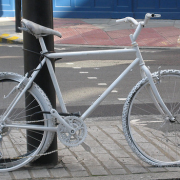 Today the government is planning to outlaw squatting in a populist move that will see a very vulnerable group of homeless people criminalised.
Today the government is planning to outlaw squatting in a populist move that will see a very vulnerable group of homeless people criminalised.
Parliament will be debating the Legal Aid, Sentencing and Punishment of Offenders Bill, which contains a proposed late amendment that would make squatting of residential properties a criminal offence. This means the police can enter a property by force and evict the occupants within days, prosecute and even jail squatters. In Scotland, where squatting is already illegal, offenders can be jailed for 21 days.
As the law stands, staying in an empty house is not a criminal offence but a breach of the civil law, meaning a court order is required by the landlord to remove squatters. Section 6 of the 1977 Criminal Law Act explicitly protects the rights of occupiers of properties.
Squatting is a tradition that goes back hundreds of years. From the Kett Rebellion to the Second World War, when millions of homeless people took to squatting all across Europe. In my home country, the Netherlands, squatting became a political force against property vacancy at a time of social housing need in the 70’s and 80’s. Local authorities encouraged squatting as it functioned as a broker between the council and private developers who were sitting on properties usually waiting for a more profitable time for development.
In the public mind however, the dominant image of a squatter is a white, dreadlocked, middle-class, hippie type figure enjoying an alternative lifestyle by living in someone else’s property, freeloading off the rest of the rent, mortgage and taxpaying society. Public opinion about squatting has more recently been informed by the tabloids’ potent mix of class resentment and xenophobia. See for example this article describing how young Latvians occupied a £6m mansion in Highgate.
Whilst there are plenty of dreadlocked middle class squatters who make a lifestyle choice for a few years, people who have actually been involved in the squatter movement know that the dominant media image is far removed from reality.
A recent report undertaken on behalf of homelessness charity Crisis, shows that most people squat out of necessity, often the only way to avoid a night on the streets. The report found that 90% of squatters had slept rough. Forty six per cent of single homeless people who had squatted had mental health problems, almost half, 47%, had drug dependency issues, while 34% had previously been in care.
Consider that the entry level for a one-bedroom private rented flat in Hackney is £190 per week, which means you need to cough up a £760 deposit. If you cannot afford this, the average waiting time for a hostel is three weeks. Put simply, squatting is a logical outcome of an affordable housing crisis.
During my time as volunteer support worker at New Horizon Youth Centre in Camden, a day centre for homeless youth, I quickly discovered that squatting is often the only option for those in need – rough sleepers, youngsters kicked out of home, or those without family in London and nowhere to go. I remember a 17-year-old Irish girl with serious mental health issues who came to the centre after a night of rough sleeping telling me the police had told her to move on 12 times. Under new legislation she would become a criminal for seeking a good night’s sleep without harassment.
Squatting has much more to do with need than with lifestyle choices. It provides homeless people with the only community of care they can have access to. Squats are usually welcoming of new residents and enjoy a culture of solidarity and creativity. Countless squats in London have opened community centres, day schools, libraries and swap shops open to anyone who wants to join.
Squatting is deeply political when done well – a derelict building in private hands is opened to the public for shelter in a time of housing need. Property owners can sit on their stock for years waiting for housing prices to go up, or just for the sake of it. In Hackney the housing waiting list is 18,000 households with hardly any social housing being built year on year. In Tower Hamlets the figure is 22,000, with countless empty properties in these boroughs.
This amendment, proposed by Crispin Blunt MP, is a populist measure to outlaw unconventional behaviour. It comes as no surprise of course to see a proposal to outlaw squatting in a land where the private sphere is being extended at every available opportunity at the expense of that which is held publicly. It is also an attack on an autonomous social movement, further ripping apart Britain’s social fabric. This time not because these people are dependent on the state for survival, but because they are sitting on assets that could generate huge profits for those who own them.
The history of squatting is the history of ordinary people trying to prevent the wealthy from accumulating land, properties as well as rights that once were in public hands. That’s why councillors, MP’s and public figures should get behind the SQUASH campaign and defeat this amendment.
Twitter: @KoosCouvee





good work